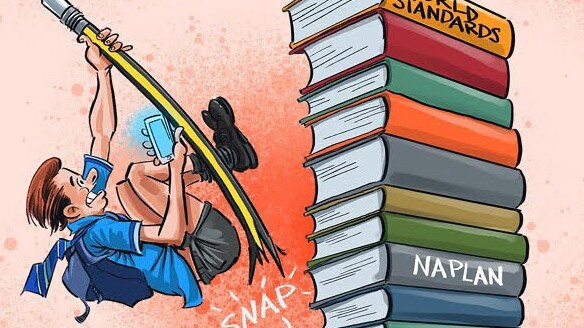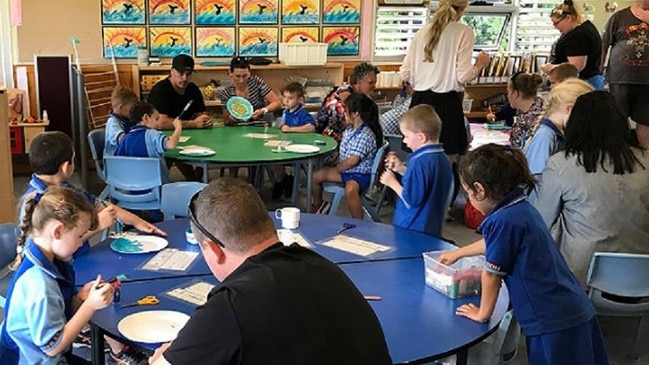Kevin Donnelly: Time for a complete reset of our education system
The latest NAPLAN results are an appalling indictment of those in control of Australia’s education system, both past and present, writes Kevin Donnelly.
Opinion
Don't miss out on the headlines from Opinion. Followed categories will be added to My News.
The latest NAPLAN results are an appalling indictment of those in control of Australia’s education system, both past and present. And given the current review of the NSW school curriculum is led by one of those educators in charge for the last 10 to 20 years, expect things to get a lot worse.
Despite a 30 per cent increase in spending 2005-06 to 2015-16 and an annual budget of over $61 billion for schools overall literacy and numeracy standards have failed to improve.

Add the fact that the bar is set so low for NAPLAN compared to international tests (where ever greater numbers of Australian students fail) and it’s obvious that generations of students are leaving school without the knowledge and skills urgently required if they are to succeed.
What is to be done?
Despite what education ministers and self-proclaimed experts like Peter Goss from the Grattan Institute pretend, there is no simple solution or magic bullet. What is needed is a root and branch renewal of Australia’s education system that takes a medium to long term view and is based on sound research and proven evidence.
Forget the NSW’s Teachers Federation’s incessant demand for more money. The latest results prove more spending is not the answer and overseas systems that outperform Australia spend less on education as a percentage of GDP and per student and still achieve outstanding results.
There’s no doubt that curriculums across Australia are overcrowded and substandard.
Teachers are being forced to teach everything from stranger danger to healthy eating, road safety, water safety and wellness and resilience — things for which parents should be responsible.
TODAY’S TOP STORIES
The curriculum is also so politically correct with its focus on Aboriginal history, Asia and the environment plus global warming. Add to that programs such as Safe Schools and Respectful Relationships and it is easy to see how not enough time is spent on the basics and essential knowledge and skills.
Through no fault of their own, classroom teachers are forced to adopt fads that are guaranteed to lower standards and make teaching more difficult. Instead of explicit teaching and being in control teachers are told to be ‘facilitators’ and ‘guides by the side’, placing students centre stage and in control.

Whole language, based on the mistaken belief that learning to read is as natural as learning to talk and that primary children will succeed if they are simply surrounded by books, is also widespread even though research proves teaching phonics and phonemic awareness is more effective.
The overemphasis on digital technology is also contributing to lower standards.
Unlike Australia, stronger performing countries have not invested millions into computers and accessing the internet on the basis that memorisation and rote learning are essential — especially during the early years.
Instead of relying on calculators and computers, research into the most effective way to learn stresses the importance of what is called ‘automaticity’ — essential knowledge and skills like times tables and learning to read have to be automatic before students can be creative and complete more complex tasks.
MORE OPINION:
Jackie French: This is the best way to help your kids thrive
Editorial: ICAC’s Kaila Murnain show continues to deliver
What’s the opposite of a glowing goddess? That’s my pregnancy
Add the fact that Australian classrooms are among the most disruptive and noisy across the OECD countries and teachers are being drowned in bureaucracy and red-tape it’s no wonder too many teachers are burnt out and refuse to make teaching a long-term career.
University education departments and how beginning teachers are trained also must be improved. Too many teacher academics have never taught in schools and much of what trainee teachers learn is too theoretical and abstract.
Trainee teachers need to spend more time in schools being mentored by experienced, successful teachers and more needs to be done to support such teachers once they begin their teaching career.
The expression parents are their children’s first teachers is as true now as it always was and parents have to realise that they have a key role to play. Children need to be taught to respect others, especially teachers, and that learning requires hard work and concentration.
Too many children enter primary school never having seen a picture book or to have been read to by their parents and allowing children to exist in virtual world denies them the ability to socialise and learn to engage face-to-face with others.
Surfing the internet and digital screens, as argued by the Oxford professor Susan Greenfield, also scrambles a child’s brain and leads to a situation where it’s impossible for them to sit still and concentrate for long periods of time — essential to mastering anything worthwhile.
In 2004 I wrote Why Our Schools Are Failing and argued there was a crisis in education as literacy and standards were falling and too many students were leaving school morally adrift and culturally illiterate.
Despite a revolving door of governments and ministers nothing has changed.
Dr Kevin Donnelly is a Senior Research Fellow at the Australian Catholic University and in 2014 he co-chaired the review of the Australian National Curriculum.
